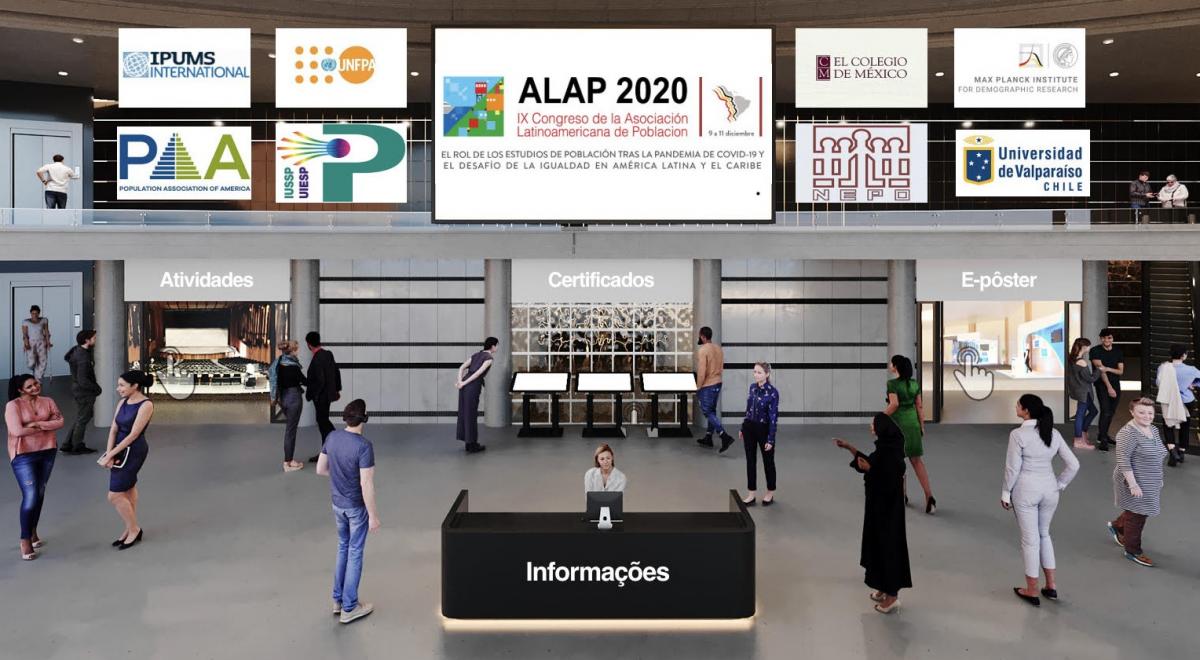IUSSP at ALAP 20209-11 December 2020
The IUSSP actively participated in the virtual IX Conference of the Latin American Population Association (ALAP) with a virtual exhibit and four sessions, 3 of which were organized by IUSSP including a round table on Rethinking training in demography for the 21st Century. The conference, which was initially to take place in Chile, was transformed into an entirely virtual meeting.
Read below for a description of the sessions involving IUSSP. Round Table: Regional Population Associations Following up on a similar session at the IUSSP International Population Conference 2017 in Cape Town, ALAP organized a Round Table of Regional Population Associations at its recent virtual conference on Dec 9 2020. The Round Table discussed population challenges in world regions and the work of the regional associations. Moderated by Georgina Binstock (ALAP), the following association presidents participated: Ignacio Pardo (ALAP), Aris Ananta (Asian Population Association, APA), Donatien Beguy (Union for African Population Studies, UAPS) and Helga de Valk (European Association for Population Studies, EAPS).
IUSSP President Tom Legrand opened the discussion, noting both similarities as well as regional differences in population dynamics across the world, such as population ageing, population growth and decline, migration/mobility and urbanization, not to forget health and environment interactions. Against this backdrop, the regional associations have an impressive track record of activities and experiences that benefit our (inter-)discipline of population studies. Overarching themes include the need for reliable data and rigorous methods for population analysis as well as innovative approaches to both. These are shared concerns for all, as is training. Fostering diversity and inclusiveness in their membership and activities and involving new generations of researchers in their work, are common challenges for the associations, who are all coping with the COVID-19 pandemic and moving their activities online. The presidents expressed the need to regularly exchange experiences and share good practices, for instance with online events, and, to coordinate activities where possible to address the ever-growing number of online events that threaten to overburden their members. Future round tables of the regional associations are warmly welcomed by all associations as well as by the IUSSP.
Round Table: Priorities in Research and Information Generation on International Migration: Prospects for a Global Migration Survey This round table was organized and chaired by Marcella Cerruti (National Scientific and Technical Research Council – Argentina) on behalf of the IUSSP Scientific Panel on International Migration. Speakers included Diego Iturralde (Statistics South Africa ) who spoke about the ‘Challenges and possibilities of a World Migration Survey pilot in Africa’ while Philippe Fargues (European University Institute) presented more generally on “Prospects for a World Migration Survey”. Silvia Giorgiuli Saucedo (El Colegio de México) speaking on “Lessons learned from long-standing multi/sited surveys in Latin America” brought the experience of Latin America to the table. Frank Laczko (IOM’s Global Migration Data Analysis Centre) ended the session by focusing on “The role of WMS to fill data gaps for research and policy interventions.” Though the session got off to a late start, it was well attended with over 35 participants and fruitful discussion.
IUSSP session on the status of the 2021 International Population Conference Mary Ellen Zuppan (IUSSP Executive Director) and Nico Van Nimwegen (Secretary-General) gave an overview of IUSSP activities and an update on plans for a virtual 2021 International Population Conference. Members of the IUSSP Early Career Task Force also presented some of their ideas to increase participation by early career researchers in IUSSP activities. After a short presentation, there was an open Q & A with participants on the forthcoming virtual conference format (Please see the article on IPC 2021 in this bulletin for more details). Round Table: Rethinking training in demography for the 21st Century The round table provided a forum for exchange and reflection on graduate student training in light of recent major changes in the data and methods used by demographers (e.g., Big Data), new topics of analysis (e.g., COVID-19; climate change), changes in university policies and funding, and innovations in training programs. Tom LeGrand (IUSSP president) provided an overview of the issues and moderated the session, which included the following presentations and speakers :
Training Demographers for a World in Transition. Sonalde Desai (incoming PAA president, professor at the University of Maryland and director of the NCAER-National Data Innovation Centre in New Delhi) gave a wide-ranging presentation. She ended with the recommendation that training should differ between Northern and LMIC institutions, with institutions in the Global South increasing their emphasis on policy outreach.
Training in demography in uncertain times: Challenges in a context of changing policies regarding higher education in Latin America. Silvia Giorguli Saucedo (professor of demography and president of El Colegio de Mexico) focused on how policies in Latin America are altering support for publicly funded graduate schools. She described the ensuing challenges for demographic training programs and questioned whether graduates trained by existing programs are well-adapted to the labour market.
University training in demography: What are the challenges in Brazil? Jordana Cristina de Jesus (adjunct professor of Demography and Actuarial Science at the Universidade Federal do Rio Grande do Norte in Natal, Brazil) spoke from the perspective of a young professor from a poorer Black family. She emphasized the importance of ensuring more inclusive demographic training in Brazil and recruiting promising graduate students from disadvantaged groups (Black, indigenous, etc.).
Challenges for advanced demographic research training: Lessons from the European Doctoral School of Demography (EDSD). Frans Willekens (Emeritus Professor at the University of Groningen, former director of NIDI and Senior Researcher & Chief Research Coordinator at MPIDR) has been closely involved with the development of the EDSD. He spoke convincingly of the value of such a program for ensuring high-quality training in the population sciences in the European context – a model that may be replicable elsewhere.
The session ended with a lively discussion and agreement on the value of continuing exchanges on these issues in the future. |

